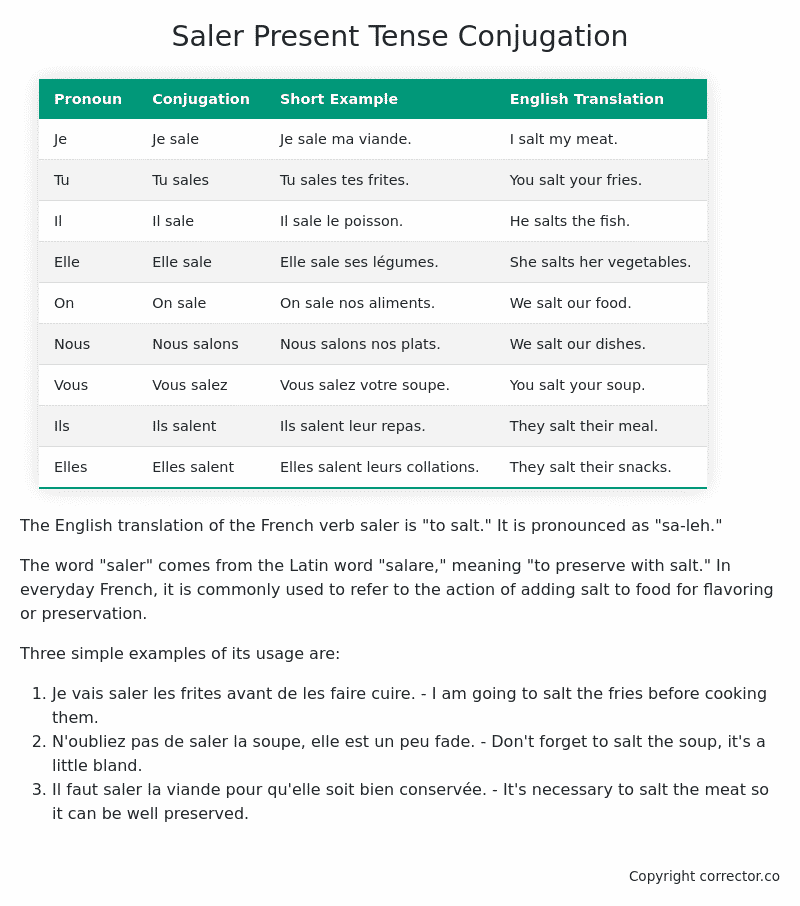Le Present (Present Tense) Conjugation of the French Verb saler
Introduction to the verb saler
The English translation of the French verb saler is “to salt.” It is pronounced as “sa-leh.”
The word “saler” comes from the Latin word “salare,” meaning “to preserve with salt.” In everyday French, it is commonly used to refer to the action of adding salt to food for flavoring or preservation.
Three simple examples of its usage are:
- Je vais saler les frites avant de les faire cuire. – I am going to salt the fries before cooking them.
- N’oubliez pas de saler la soupe, elle est un peu fade. – Don’t forget to salt the soup, it’s a little bland.
- Il faut saler la viande pour qu’elle soit bien conservée. – It’s necessary to salt the meat so it can be well preserved.
Saler – About the French Present Tense
To take a deep dive into all the French tenses then see our article on Mastering French Tense Conjugation.
Common Everyday Usage Patterns For Le Present
Interactions with Other Tenses
Table of the Present Tense Conjugation of saler
| Pronoun | Conjugation | Short Example | English Translation |
|---|---|---|---|
| Je | Je sale | Je sale ma viande. | I salt my meat. |
| Tu | Tu sales | Tu sales tes frites. | You salt your fries. |
| Il | Il sale | Il sale le poisson. | He salts the fish. |
| Elle | Elle sale | Elle sale ses légumes. | She salts her vegetables. |
| On | On sale | On sale nos aliments. | We salt our food. |
| Nous | Nous salons | Nous salons nos plats. | We salt our dishes. |
| Vous | Vous salez | Vous salez votre soupe. | You salt your soup. |
| Ils | Ils salent | Ils salent leur repas. | They salt their meal. |
| Elles | Elles salent | Elles salent leurs collations. | They salt their snacks. |
Other Conjugations for Saler.
Le Present (Present Tense) Conjugation of the French Verb saler (this article)
Imparfait (Imperfect) Tense Conjugation of the French Verb saler
Passé Simple (Simple Past) Tense Conjugation of the French Verb saler
Passé Composé (Present Perfect) Tense Conjugation of the French Verb saler
Futur Simple (Simple Future) Tense Conjugation of the French Verb saler
Futur Proche (Near Future) Tense Conjugation of the French Verb saler
Plus-que-parfait (Pluperfect) Tense Conjugation of the French Verb saler
Passé Antérieur (Past Anterior) Tense Conjugation of the French Verb saler
Futur Antérieur (Future Anterior) Tense Conjugation of the French Verb saler
Subjonctif Présent (Subjunctive Present) Tense Conjugation of the French Verb saler
Subjonctif Passé (Subjunctive Past) Tense Conjugation of the French Verb saler
Subjonctif Imparfait (Subjunctive Imperfect) Tense Conjugation of the French Verb saler
Subjonctif Plus-que-parfait (Subjunctive Pluperfect) Tense Conjugation of the French Verb saler
Conditionnel Présent (Conditional Present) Tense Conjugation of the French Verb saler
Conditionnel Passé (Conditional Past) Tense Conjugation of the French Verb saler
L’impératif Présent (Imperative Present) Tense Conjugation of the French Verb saler
L’infinitif Présent (Infinitive Present) Tense Conjugation of the French Verb saler
Struggling with French verbs or the language in general? Why not use our free French Grammar Checker – no registration required!
Get a FREE Download Study Sheet of this Conjugation 🔥
Simply right click the image below, click “save image” and get your free reference for the saler Present Tense tense conjugation!

I hope you enjoyed this article on the verb saler. Still in a learning mood? Check out another TOTALLY random French verb present conjugation!


